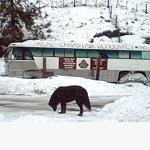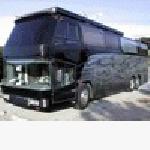| Author | Message | ||
| Renee (Reneeamg)
Registered Member Username: Reneeamg Post Number: 9 Registered: 2-2001 Posted From: 207.200.116.13 Rating: N/A |
I have been stuck in this park for awhile and last month the Dept of Housing inspector came by and cited everyone in here and the park with multiple violations. One of mine is they don't like the regular RV flexible sewer hose and standard equipment. If you are in a California park for over 3 months you must permanently connect with hard pipe to the sewer. They also do not like that my electrical cord is not long enough to reach the utility box and I have an extension on it. My extension and my bus cord have a 3 prong "regular" fitting, so there is a pictail built special to convert it to the configuration of the park. I am told by some I should rewire the bus from breaker box to park box with a long enough cord and the park compatible end on it. I have no idea where that wire goes - under the bus? Through what? Braced by what? I have these visions of them trying to pull the wire through (spliced to a new wire) and have it hang up someplace and end up with no electricity at all. It was 102 yesterday. I am dealing with guys who think they can just jack up one side of the bus, see underneath and get it all taken care of, to others who say start it up (air it up) and we can crawl under it. I am saying, "NO". Seems to me a grandfather clause should allow the wire I have and an extension. Has anyone had to solve such a problem? If so, what did you do? | ||
| Clint Hunter (Truthhunter)
Registered Member Username: Truthhunter Post Number: 188 Registered: 1-2009 Posted From: 24.129.235.190  Rating: N/A |
... often the ideal way to deal with Dept of most everything or extreme climate is to turn the ignition switch , push the start button, release the brake and drive away. Not to make light of the safety concerns they may have justifiably raised, as real safety is always the highest concern. | ||
| George M. Todd (George_mc6)
Registered Member Username: George_mc6 Post Number: 828 Registered: 8-2006 Posted From: 64.55.111.6 Rating: N/A |
Renee, Grandfathering in an unsafe electrical connection won't make it safe. Neither is it safe to go under an aired up air ride bus! So, please call my cell in my profile after 8am in the morning. I will be through Sac on my way to LA from Auburn late morning, and will be glad to stop by and take a look. George | ||
| macgyver (91flyer)
Registered Member Username: 91flyer Post Number: 408 Registered: 11-2004 Posted From: 12.198.81.194  Rating: |
Renee... If you've been reading the thread about me lately... You know my parents just lost their home, and I just lost mine (the bus) which was parked in front of their home... The most likely culprit was an electrical short caused by rodents chewing through the wiring... But, the point is... Electricity is something you should have a healty fear of... And respect. It can keep you cool, or burn your dream to the bare rims. Take it from me... I'm lucky that my coach didn't flame down to the rims.. I can save my coach... Do you think the fire dept can get to your coach in the event that your mains connection faults, shorts out and sets fire to your coach? Would you be willing to go through the heartache and pain that I'm now going through? If you have companions (pets)... Don't you owe it to them to make sure your electricity is safely delivered to where it needs to go? Granted, my fire wasn't caused through neglect or neglegence... It didn't even start in my coach, but my coach is my home... I'm now homeless... Do yourself (and everyone around you) a favor... Listen to the guy about your electrical connections. It might seem like they are just being a pain in the ass and trying to be difficult... But, sometimes there's really a reason for them to be. They really are trying to help you in this instance... Now, your sewer hose? Who cares? It's a sewer hose. It's not going to kill you like a bad mains cable will. Just my 2c after a disaster.... -Mac | ||
| Jim Wallin (Powderseeker01)
Registered Member Username: Powderseeker01 Post Number: 18 Registered: 10-2008 Posted From: 208.68.48.77  Rating: |
I have seen many bus conversions where folks have utilized questionable methods for distributing power. In my case the PO had wired the entire bus with cut up extension cords run under the carpeting. I might have never known if I hadn't stripped it to the shell during my renovation. When I put it back togeather I wired it for 50A using 6/4 wire all the way to my 100A panel and stranded #12 in conduit internally. I am presently using a 50-30A conversion pigtail since the park I am in at the moment only offers 30A hookups. You should also pay attention to the configuration of the neutral and ground connections, making sure that they are NOT connected in your panel when using a park pedistal- but they MUST be connected in your panel when using your generator. If your system doesn't have an automatic transfer switch, you may want to verify your configuration. Having fire extinguishers handy when your neighbors extension cord fails is also helpful. Jim | ||
| George M. Todd (George_mc6)
Registered Member Username: George_mc6 Post Number: 830 Registered: 8-2006 Posted From: 64.55.111.6 Rating: N/A |
We're going to ASSUME that by a 3 prong cord, with a "regular" plug on both the bus cord, and the extension, that it is a 15 AMP 120 Volt configuration? Then by "Pigtail built special to connect it to the park," we have a 30 AMP RV connection? So, we know its fused for 200% of the cord and plug rating, WITHOUT EVEN SEEING IT!!!! Mac has put the original post in the proper perspective, and; Jim has hit the nail right on the head, with a sledgehammer! George | ||
| Sean Welsh (Sean)
Registered Member Username: Sean Post Number: 850 Registered: 1-2003 Posted From: 67.142.130.34  Rating: N/A |
Renee, With regard to the electrical issue, you have not given us enough information to properly advise you. For example, when you say "regular" plug, is that a 15-amp household type plug such as you might find on a lamp or coffeemaker, or something else? What gauge is the cord you have now? How long? How is it attached at the coach end? The sewer problem is easily solved: Simply disconnect from the sewer and store the hose. Use your tanks. When your tanks start to get full, attach the hose and dump them, then store the hose again. You will then be in compliance with California law (I lived in a CA trailer park for two years). BTW, the state does have a reason for this. Flexible sewer hoses are not really made to be exposed to the elements permanently. They tend to break down in full sunlight from UV degradation, and they are subject to being chewed through by rodents. This can lead to escaping sewer gas and even raw sewage on the ground, a significant health risk. As has been noted, the electrical issue is a greater threat to your personal safety and should be resolved properly as soon as practical. And as my good friend George said, "grandfathering" something that is unsafe does not make it safe. FWIW, it is highly likely that the cord configuration you have was never legal or code-compliant, so the term "grandfather" does not even apply. If the coach was self-converted, there was likely no oversight or code enforcement, and the rig can be riddled with such problems. If you peruse the archives here, you will find many statements along the lines of "the code does not apply to me and/or I am not going to follow it." Very, very few people will ever encounter a code enforcement official, and so they get away with it; your experience is first-hand evidence that it does happen, though. -Sean http://OurOdyssey.BlogSpot.com | ||
| Keith Wood (Ft6)
Registered Member Username: Ft6 Post Number: 114 Registered: 8-2008 Posted From: 70.212.148.0 Rating: N/A |
If you have a license plate on your rig, it's not a house, it's a vehicle. That means everything connected to shore is a "temporary connection" -- the bureaucrats are just counting on everyone paying the fines without questioning whether they actually have any authority over vehicles. While I agree that you need to fix the electrical issue, the fact of the matter is that, absent some WRITTEN proof of authority, you should tell them to go bother someone a mile or so over. | ||
| Sean Welsh (Sean)
Registered Member Username: Sean Post Number: 851 Registered: 1-2003 Posted From: 67.142.130.17  Rating: N/A |
Keith, I'm sorry, but you are just plain incorrect where CA law is concerned. Most jurisdictions define "temporary" as 90 days. The CA dept. of housing, as well as HUD, do in fact have jurisdiction over trailer parks AND any accommodation therein, licensed as a vehicle or not. Also, California does not recognize limits on "jurisdictions." Any law enforcement officer can cite you anywhere in the state under any code. People tend to be surprised (or incredulous) when they get pulled over on the freeway by a park ranger for speeding, for example, or by a BART cop for failure to yield. Many, if not most, other states also have defining cut-offs between temporary "recreational" use and what they consider "living accommodation." Washington, for example, in a widely violated law, prohibits anyone from dwelling in a recreational "RV park" for more than six months each year. If a park allows anyone to stay longer than that, it puts the park in a whole different category and raises the bar for compliance with a whole raft of regulations. -Sean http://OurOdyssey.BlogSpot.com | ||
| Jim Gibson (River_rat)
Registered Member Username: River_rat Post Number: 48 Registered: 1-2009 Posted From: 75.95.96.192 Rating: N/A |
Jim, Could you please elaborate a bit on the ground-neutral comment? I'm just getting my genset on my 04 and want to be sure it's safe! Almost had a house fire once - plugged my trailer into an extension cord, had the air on and noticed smoke in the patio. The extension cord was too long and left in a coil near the plug - the inductive coupling created in the coil generated so much heat that it melted the cord and it was just starting to flame! Extension cords = danger! Thanks Jim | ||
| Chuck Newman (Chuck_newman)
Registered Member Username: Chuck_newman Post Number: 347 Registered: 1-2005 Posted From: 99.0.41.3  Rating: N/A |
Sean, "The CA dept. of housing, as well as HUD, do in fact have jurisdiction over trailer parks AND any accommodation therein, licensed as a vehicle or not." That's true, and with your knowledge of same, you may have some advice for me. I am converting our bus to NFPA 58/ANSI A119.2. Since I am not a member of RVIA, they are not interested in me, and I cannot get a gold RVIA sticker attesting to quality construction. Do you know if Cal Housing, HUD, Cal Fire Marshal, etal. offers an inspection service and a sticker, for a fee naturally? | ||
| Sean Welsh (Sean)
Registered Member Username: Sean Post Number: 852 Registered: 1-2003 Posted From: 67.142.130.18  Rating: N/A |
Ground and neutral need to be connected to each other in exactly one place (no more, no less). When connected to shore power, the ground-neutral connection is in the shore system, and so MUST NOT be in the coach. When connected to generator, the ground-neutral connection should be in the generator itself. The implication of this is that if you have, as most do, a system which can use either shore or generator power, then whatever switching mechanism you use must switch the neutral as well as the hot(s). If you also have an inverter, this complicates the situation. Do a search through the archives on this topic -- we've discussed it at great length here many times.
Not as far as I know, Chuck. To be honest, most code enforcement officials are pretty ignorant of ANSI 1192 and the RV-specific provisions of the NEC. Even manufacturers don't usually get inspected -- they "self-certify" to RVIA compliance, and are entitled to the stickers. The RVIA sends random inspectors out periodically to ensure that the manufacturers are doing what they claim. Your best bet is to get the codes and follow them, and keep a copy with you. Most code officials will back down when presented with documented evidence that you followed the standards that were in place when you did the work -- but there are, inevitably, jerks who will not. As with anything, if cited, your choice is to pay or fight it in court. As I said earlier, though, actual citations for code violations in the RV arena are as rare as hen's teeth. I would be very leery of even asking, say, a fire marshal to do a "courtesy" inspection. Without a current familiarity with the RV codes, they are likely to ding you for things that are mandatory in an RV but would be unlawful in a fixed structure. -Sean http://OurOdyssey.BlogSpot.com | ||
| John MC9 (John_mc9)
Registered Member Username: John_mc9 Post Number: 902 Registered: 7-2006 Posted From: 74.162.76.110  Rating: N/A |
Renee - They make a 50 amp weatherproof external connection for RVs, that allow you to connect an RV shoreline (extension cord) to, to enable you to connect to the power outlet. The problem you have, isn't with the manner that your RV is wired for "normal" camping, but for an extended/permanent stay. In the "extended" mode, they apparently want you to conform to "mobile home" codes, rather than the more lax "recreational vehicle" codes. I wouldn't sweat the semantics, and as another poster said..... Turn the key and move on. It's much ado about nuttin', and too political to be concerned; it's all about the $$$. Start 'er up & move 'er out! | ||
| John MC9 (John_mc9)
Registered Member Username: John_mc9 Post Number: 903 Registered: 7-2006 Posted From: 74.162.76.110  Rating: N/A |
Sean - Re: "As I said earlier, though, actual citations for code violations in the RV arena are as rare as hen's teeth. I would be very leery of even asking, say, a fire marshal to do a "courtesy" inspection. Without a current familiarity with the RV codes, they are likely to ding you for things that are mandatory in an RV but would be unlawful in a fixed structure. " I missed that prior to posting. There should be a concentrated effort to encourage bus "converters" to purchase and use basic electrical test equipment. It is as important to know there is a hazard, than trying to teach how to prevent a hazard; building "shockless" is not absolutely preventing electrocution..... (thanks for your candor!) |